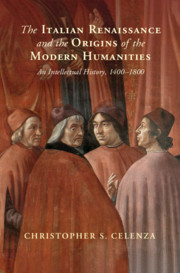'An engrossing story about how modernity was born when it learned to read and write the word. The parallels between the Italian Renaissance and our contemporary present are stunning. As before, so now: information glut and a rapidly evolving mediascape are challenges that only a new investment in critical sense-making – 'philology,' broadly understood – can meet. Celenza’s call for a reinvigorated culture of the humanities today is both historically rich and prescient. His book is sure to bring a new dimension to the debates about the uses and reach of culture today.'
James I. Porter - University of California, Berkeley
'A powerful history, cutting through the artificial line too-often drawn between Renaissance and Enlightenment to present one continuity, the quiet revolution underlying all the others: the slow, painstaking advance of the conviction that knowledge-seeking can and should be unending, unlimited, and open to everyone.'
Ada Palmer - University of Chicago
'Christopher Celenza brilliantly threads the needle to produce a portrait of Italian Renaissance humanism for our time. Deeply attentive to personal experiences and personal ties, he injects agency and emotion into the celebrated practice of classical and biblical philology, astutely examining figures who include Valla, Poliziano, Decembrio, and even Descartes. Celenza’s enduring claim is that philology was and remains inextricably connected with philosophy.'
Kristine Haugen - California Institute of Technology
‘This is a thoughtful book on an important topic … Highly recommended.’
P. Grendler
Source: Choice
‘Everyone concerned with the humanities and their decline, whether within the university or outside, should read this book.’
Pamela O. Long
Source: Renaissance Quarterly
‘Celenza exemplarily demonstrates that the humanities constitute a method in themselves to explore the world and to exchange view … With his love song to the humanities, Celenza offers an enjoyable read. Even difficult matters are explained in a way non-specialists and laymen will understand too.’
Isabella Walser-Bürgler
Source: American Historical Review



